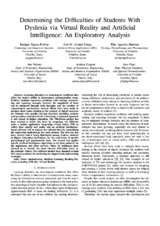Mostrar el registro sencillo del ítem
Determining the Difficulties of Students With Dyslexia via Virtual Reality and Artificial Intelligence: An Exploratory Analysis
| dc.contributor.author | Yeguas-Bolívar, Enrique | |
| dc.contributor.author | Alcalde-Llergo, José M. | |
| dc.contributor.author | Aparicio Martínez, Pilar | |
| dc.contributor.author | Taborri, Juri | |
| dc.contributor.author | Zingoni, Andrea | |
| dc.contributor.author | Pinzi, Sara | |
| dc.date.accessioned | 2024-01-10T07:58:39Z | |
| dc.date.available | 2024-01-10T07:58:39Z | |
| dc.date.issued | 2022 | |
| dc.identifier.isbn | 978-1-6654-8573-9 | |
| dc.identifier.uri | http://hdl.handle.net/10396/26464 | |
| dc.description.abstract | Learning disorders are neurological conditions that affect the brain’s ability to interconnect communication areas. Dyslexic students experience problems with reading, memorizing, and exposing concepts; however the magnitude of these can be mitigated through both therapies and the creation of compensatory mechanisms. Several efforts have been made to mitigate these issues, leading to the creation of digital resources for students with specific learning disorders attending primary and secondary education levels. Conversely, a standard approach is still missed in higher education. The VRAIlexia project has been created to tackle this issue by proposing two different tools: a mobile application integrating virtual reality (VR) to collect data quickly and easily, and an artificial intelligence-based software (AI) to analyze the collected data for customizing the supporting methodology for each student. The first one has been created and is being distributed among dyslexic students in Higher Education Institutions, for the conduction of specific psychological and psychometric tests. The second tool applies specific artificial intelligence algorithms to the data gathered via the application and other surveys. These AI techniques have allowed us to identify the most relevant difficulties faced by the students’ cohort. Our different models have obtained around 90% mean accuracy for predicting the support tools and learning strategies. | es_ES |
| dc.format.mimetype | application/pdf | es_ES |
| dc.language.iso | eng | es_ES |
| dc.publisher | IEEE | es_ES |
| dc.rights | https://creativecommons.org/licenses/by-nc-nd/4.0/ | es_ES |
| dc.source | Yeguas-Bolivar, E., Alcalde-Llergo, J. M., Aparicio-Martínez, P., Taborri, J., Zingoni, A., & Pinzi, S. (2022). Determining the difficulties of students with dyslexia via virtual reality and artificial intelligence: an exploratory analysis. 2022 IEEE International Conference on Metrology for Extended Reality, Artificial Intelligence and Neural Engineering (MetroXRAINE). Rome, Italy. doi: 10.1109/MetroXRAINE54828.2022.9967589 | es_ES |
| dc.subject | Inclusiveness | es_ES |
| dc.subject | Machine Learning | es_ES |
| dc.subject | Reading Disorder | es_ES |
| dc.subject | Learning Difficulty | es_ES |
| dc.subject | Virtual Reality | es_ES |
| dc.title | Determining the Difficulties of Students With Dyslexia via Virtual Reality and Artificial Intelligence: An Exploratory Analysis | es_ES |
| dc.type | info:eu-repo/semantics/conferenceObject | es_ES |
| dc.relation.publisherversion | http://dx.doi.org/10.1109/MetroXRAINE54828.2022.9967589 | es_ES |
| dc.relation.projectID | Unión Europea. KA2.2020-1-IT02-KA203-080006 | es_ES |
| dc.rights.accessRights | info:eu-repo/semantics/openAccess | es_ES |

